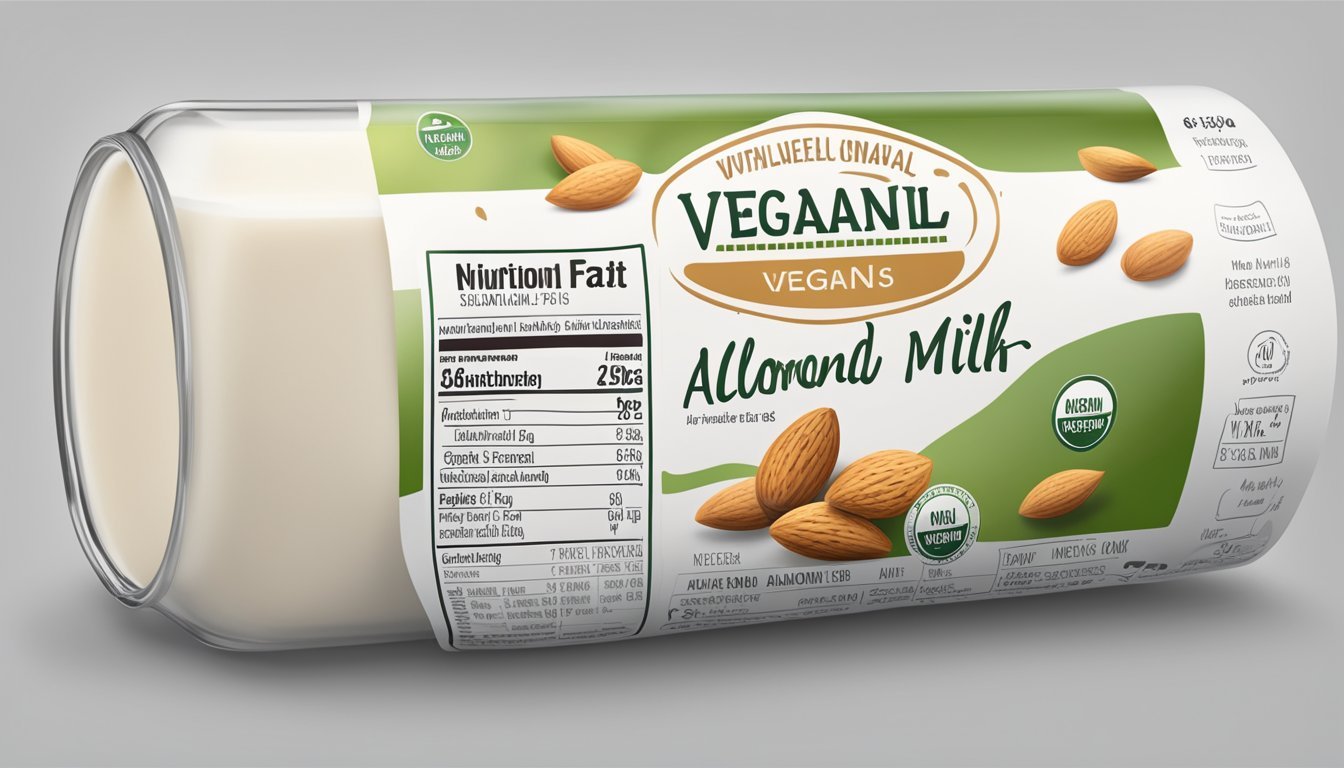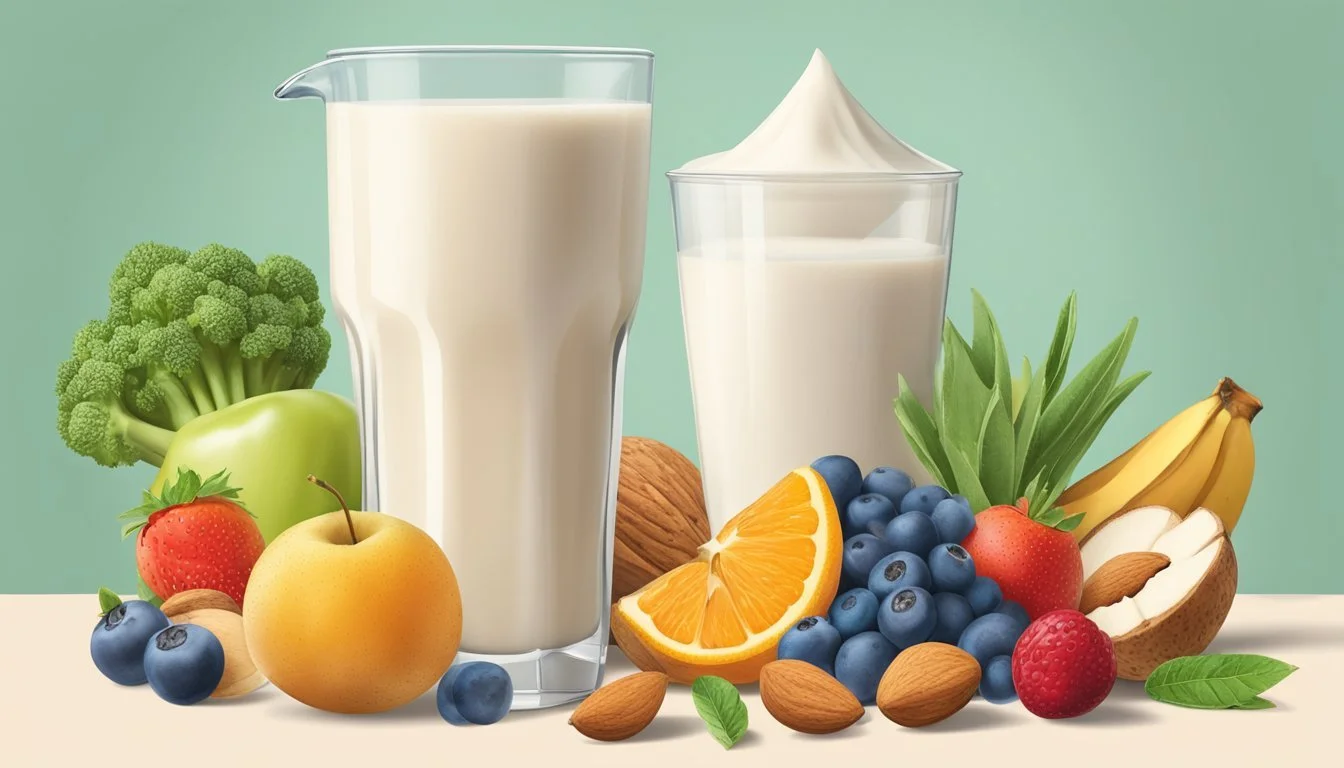Is Almond Milk Vegan?
Understanding Plant-Based Milk Options
Almond milk, a plant-based alternative to traditional dairy milk, has gained substantial popularity in the dietary landscape, particularly among vegans and those with lactose intolerance. The product is derived from almonds, a nutrient-dense nut, which is blended with water and then typically strained to create a milk-like consistency. This process ensures that almond milk is vegan by nature, as it does not contain any animal byproducts, making it suitable for individuals following a vegan diet.
Nutrition conscious consumers regularly turn to almond milk as a dairy substitute not only for its vegan properties but also for its low-calorie count and absence of cholesterol. Moreover, many brands fortify their almond milk with additional nutrients like calcium and vitamin D to match the nutritional benefits offered by cow's milk without compromising vegan principles. Nevertheless, it is important for vegans to scrutinize product labels, as certain additives, such as vitamin D3, may be animal-derived, whereas vitamin D2 is plant-sourced and vegan-friendly.
Given the concerns for ethics and dietary restrictions, almond milk producers generally avoid the use of animal-derived sweeteners like honey, opting instead for plant-based alternatives. The result is a versatile beverage that not only caters to the vegan community but also appeals to a broader audience looking for healthier options in their diets.
What is Almond Milk?
Almond milk is a plant-based beverage made primarily from almonds and water. This dairy-free alternative has gained popularity for its versatility and nutritional profile.
Primary Ingredients
The core components of almond milk are almonds and water. The almonds are soaked, ground, and blended with water, then strained to produce a milk-like liquid. Often, vegan almond milk is also fortified with vitamins and minerals to enhance its nutritional value.
Almond Milk Production
Almond milk production involves several steps:
Soaking the almonds
Grinding them with water
Filtering the mixture to remove solids
Optionally fortifying with nutrients such as calcium, vitamin D, and vitamin E.
Due to its simple ingredients and manufacturing process, almond milk is widely recognized as a vegan-friendly option providing a nutty flavor and consistency similar to that of traditional dairy milk.
Types of Almond Milk Flavors
Almond milk is available in a range of flavors to cater to different tastes:
Unsweetened: Pure almond milk with a natural, subtle nutty taste
Sweetened: Enhanced with sweeteners for those who prefer a sweeter taste
Vanilla: Infused with vanilla for a rich, aromatic flavor
Chocolate: Combined with cocoa for a chocolatey twist
Brands such as Califia Farms, Blue Diamond Almond Breeze, and Silk offer various flavors, catering to both culinary uses and direct consumption.
Nutritional Profile of Almond Milk
Almond milk is recognized for its nutritional benefits, such as being low in calories and rich in certain vitamins and minerals. It does not contain the high levels of protein and calcium found in cow's milk but is often fortified to enhance its nutritional value.
Vitamins and Minerals
Almond milk naturally contains vitamins E and D, although the amount of vitamin D is often enhanced through fortification. Many brands also add calcium and vitamin B12 to match the nutrient profile of cow's milk more closely. In terms of minerals, almond milk provides a modest amount of iron.
Vitamin E: An antioxidant important for skin and immune health.
Vitamin D: Typically fortified to aid in calcium absorption and bone health.
Calcium: Often fortified to levels comparable to cow's milk, supporting bone strength.
Iron: Naturally present but at lower levels than in cow's milk.
Vitamin B12: Commonly fortified, especially in almond milk designed for vegans.
Caloric Content
Almond milk is substantially lower in calories compared to cow's milk and even some other plant milks. Unsweetened almond milk can contain as few as 30 to 50 calories per 8-ounce serving, making it a lightweight addition to a diet.
Calories: About 30-50 per 8 ounces (for unsweetened varieties).
Comparison with Other Plant Milks
When compared to other plant milks, almond milk is typically lower in calories and protein but may lack the natural fiber found in soy or oat milk. Its sugar content varies by brand, especially between sweetened and unsweetened varieties. Some almond milks are specifically designed to have a richer nutritional profile through fortification.
Protein: Lower than soy or cow's milk, with around 1 gram per serving.
Fiber: Minimal amounts unless fortified.
Sugar: Ranges from 0 for unsweetened versions to higher levels for sweetened options.
Health Benefits
Almond milk offers an array of health benefits, particularly for those looking for a dairy-free alternative that's low in calories and beneficial for certain dietary needs. It is often fortified with essential nutrients, making it a nutritious choice for those looking to maintain or improve their overall health.
Bone Health
Almond milk is frequently fortified with calcium, a vital mineral for maintaining bone strength and health. This makes it a suitable option for individuals who are dairy-free or lactose intolerant and still want to support their bone health.
Heart Health
Naturally low in cholesterol and saturated fat, almond milk is a heart-healthy beverage. Its nutrient profile supports cardiovascular health, which is essential for reducing the risk of heart disease.
Dietary Considerations
For those monitoring their caloric intake, almond milk is a low-calorie option compared to traditional cow's milk. It addresses the needs of individuals who are lactose intolerant, offering a nutritious, plant-based milk alternative that avoids the lactose found in dairy products.
Almond Milk and Veganism
Almond milk fits comfortably within a vegan lifestyle and serves as a popular alternative to dairy milk. This section discusses its vegan status, environmental considerations, and the comparison between homemade and store-bought options.
Why is Almond Milk Vegan?
Almond milk is vegan because it's derived from almonds, which are plant-based sources. It contains no animal products or by-products, making it a suitable choice for those on a vegan diet. Other vegan-friendly alternatives to dairy milk include soy milk, cashew milk, oat milk, coconut milk, and rice milk. These alternatives cater to the nutritional and ethical needs of vegans, where the consumption of animal products is avoided.
Environmental Aspects of Almond Milk
The environmental impact of almond milk is a mixed bag. On the one hand, it has a lower carbon footprint compared to dairy milk, given that it doesn't involve animal farming, which is resource-intensive. However, it's important to note that almond farming itself can be water-intensive, and concerns have been raised about the sustainability of its production, particularly in drought-prone regions. Despite this, many in the vegan community view almond milk as a more sustainable choice overall when compared to animal-derived milks.
Homemade Almond Milk Vs. Store-Bought
Homemade almond milk typically contains only almonds and water, which can be more appealing for those seeking purity and simplicity in their diet. This option allows for complete transparency regarding ingredients, and one can ensure the lack of additives and preservatives.
Store-bought almond milk, on the other hand, often comes fortified with nutrients such as calcium and vitamin D—sometimes with vitamin D2 to comply with vegan standards. Although some brands may include emulsifiers or stabilizers, a conscientious shopper can find options labeled vegan that guarantee the exclusion of animal-derived ingredients.
Potential Concerns
When considering almond milk as a vegan alternative, one must evaluate certain aspects such as allergies, the presence of non-vegan additives, and the environmental impact of almond milk production to make an informed choice.
Allergies and Intolerances
Those with tree nut allergies should avoid almond milk, as it can trigger allergic reactions. Almond milk also may not be suitable for individuals with certain intolerances. It is important to check product labels and consult with a healthcare professional if there are any concerns about allergens.
Additives in Almond Milk
Commercial almond milk often contains various additives that enhance taste, texture, and nutritional value. It is essential to review these additives for their origin:
Calcium Carbonate: A mineral often added for calcium fortification.
Potassium Citrate: Utilized as a stabilizer.
Vitamin A Palmitate: Some forms may be animal-derived.
Sweeteners: Including cane sugar or honey, which is not vegan.
Preservatives: Such as carrageenan, may raise health concerns for some consumers.
Emulsifiers: Like sunflower lecithin or locust bean gum, improve consistency.
Lecithin: Often sourced from soy, it acts as an emulsifier.
It is crucial for vegans to look for almond milk labeled as vegan or verify that specific additives like Vitamin A Palmitate or sweeteners like honey are not included.
Environmental Concerns
The production of almond milk involves considerations relating to pesticides and water use. Almond farming, particularly in regions like California, requires significant water -- a concern in areas prone to drought. Moreover, the use of pesticides in almond orchards may have broader environmental implications, which raises concerns for some consumers.
How to Use Almond Milk
Almond milk, a versatile plant-based product, enriches a variety of drinks and dishes while offering a dairy-free alternative. Its low calorie and cholesterol-free profile make it a popular choice for vegans and non-vegans alike.
In Coffee and Tea
Almond milk can enhance one's morning routine by being a dairy-free creamer for coffee and tea. For a silky froth, unsweetened almond milk works best due to lower sugar content that could otherwise weigh down the foam. Heat almond milk gently, avoiding boiling, to prevent separation for a smooth cup. A dash of vanilla extract can be added for a subtle touch of flavor in coffee or tea.
Cooking and Baking
In culinary preparations, almond milk serves as a substitute for cow's milk at a one-to-one ratio in most recipes. When baking, one can achieve a rich, moist texture in cakes and muffins with almond milk's inclusion. Since it does not curdle as dairy does, it's conducive to creamy sauces and soups. For a thicker consistency, reduce the almond milk on a stovetop simmer.
Almond Milk-Based Smoothies
Almond milk stands as a prime base for smoothies, lending its nutty undertone harmoniously with various ingredients. Utilizing a blender, one can combine almond milk with fruits, vegetables, and supplements for a nutritious beverage. A typical smoothie recipe might include:
1 cup almond milk
½ cup frozen berries
1 ripe banana
Optional: A scoop of protein powder
Ice cubes, as desired
Blend until smooth. For those crafting homemade almond milk, straining with a cheesecloth ensures a silky texture, elevating the smoothie's final quality.
Choosing the Right Almond Milk
When selecting almond milk, consumers should focus on labels and familiarize themselves with vegan-friendly brands to ensure their choice aligns with a vegan diet.
Reading the Label
Consumers must meticulously read the label on almond milk to confirm it's vegan. They should look for any non-vegan additives like Vitamin D3, which is sometimes derived from animals, and instead seek out plant-sourced Vitamin D2. Organic almond milk is another option, as it's less likely to contain unwanted additives.
Vegan Certifications: Spot official vegan icons.
Ingredients: Avoid milk with additives or preservatives from animal sources.
Nutritional Information: Check if fortified with vegan-friendly calcium and vitamin D.
Identifying Vegan Brands
Some brands consistently provide vegan-friendly almond milk. Brands such as Silk, Blue Diamond Almond Breeze, Califia Farms, Malk, Pacific, and Dream are known for their plant-based milks. Here's a quick reference:
Brand Vegan-Friendly Note Blue Diamond Almond Breeze Yes Widely available and comes in various flavors Silk Yes Offers both organic and conventional almond milk options Califia Farms Yes Known for their creamy texture Malk Yes Often uses minimal ingredients Pacific Yes Provides both organic and fortified options Dream Yes Includes a range of plant-based milk products
Shoppers should seek out these brands and check the packaging for vegan labeling to ensure the product meets their dietary requirements.
Conclusion
Almond milk is considered a vegan product. It serves as a plant-based substitute for traditional dairy milk, consisting mostly of almonds and water. With no animal ingredients, such as dairy or honey, almond milk accommodates a vegan lifestyle. One should, however, be conscious of additives in commercial almond milk varieties that could potentially be non-vegan.
While generally almond milk is free of animal byproducts, it is advisable to scrutinize labels for certifications like non-GMO and organic, especially if these aspects are significant to one's dietary choices.
Potential consumers are encouraged to:
Read labels carefully for ingredients and additives.
Look for vegan certification on packaging.
Check for cross-contamination warnings if one has severe allergies.
Almond milk represents a staple in the range of dairy alternatives, aligning with vegan principles not only by its inherent composition but also through the ethical considerations and consumer demand guiding its production.





